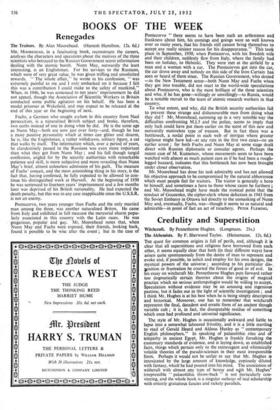BOOKS OF THE WEEK
Renegades
The Traitors. By Alan Moorehead. (Hamish Hamilton. 12s. 6d.) MR. MOOREHEAD, in a fascinating book, reconstructs the careers, analyses the characters and speculates about the motives of the three Scientists who betrayed to the Russian Government secret information dealing with the atomic bomb. Nunn May, outwardly the least interesting, is an Englishman. For his services to the Russians, which were of very great value, he was given trifling and unsolicited rewards. " The whole affair," he wrote in his confession, " was extremely painful to me and I only embarked on it because I felt this was a contribution I could make to the safety of mankind." When, in 1946, he was sentenced to ten years' imprisonment he did not appeal, though the Association of Scientific Workers in Britain conducted some public agitation on his behalf. He has been a model prisoner at Wakefield, and may expect to be released at the end of this year or the beginning of next.
Fuchs, a German who sought asylum in this country from Nazi persecutioh, is a naturalised British subject and broke, therefore, two oaths instead of one in doing what he did. He is the same alp as Nunn May—both are now just over forty—and, though he has a more positive personality which at times can glitter and disarm, he is, like the Englishman, a rather withdrawn, solitary figure, a cat that walks by itself. The information which, over a period of years, he clandestinely passed to the Russians was even more important than what they got from Nunn May ; and his full though turgid confession, angled for by the security authorities with remarkable patience and skill, is more subjective and more revealing than Nunn May's brief, almost colourless admission of his guilt. The measure of Fuchs' conceit, and the most astonishing thing in his story, is the fact that, having confessed, he fully expected to be allowed to con- tinue his distinguished work at Harwell. At the beginning of 1950 he was sentenced to fourteen years' imprisonment and a few months later was deprived of his British nationality. He had expected the death penalty, but this was in any case inapplicable since the U.S.S.R. is not an enemy.
Pontecorvo, two years younger than Fuchs and the only married man among the three, was another naturalised Briton. He came from Italy and exhibited in full measure the mercurial charm popu- larly associated in this country with the Latin races. He was gregarious, popular and gay. Mr. Moorehead notes that, when Nunn May and Fuchs were exposed, their friends, looking back, found it possible to be wise after the event ; but in the case of Pontecorvo " there seems to have been such an artlessness and frankness about him, his comings and goings were so well known over so many years, that his friends still cannot bring themselves to accept any really sinister reason for his disappearance." This took place in September, 1950, when Pontecorvo, with his Swedish wife and their children, suddenly flew from Italy, where the family had been on holiday, to Helsinki. They were met at the airfield by a man and a woman with a car. The Pontecbrvos got into the car, the car drove away and nobody on this side of the lion Curtain has seen or heard of them since. The Russian Government, who denied —in the New Testament sense—both Nunn May and Fuchs when they got into trouble, did not react to the world-wide speculations about Pontecorvo, who is the most brilliant of the three scientists and who, if he has gone—willingly or unwillingly—to Russia, would be a notable recruit to the team of atomic research workers in that country.
To what extent, and why, did the British security authorities fail to prevent these strange and dishonourable men from doing what they did ? Mr. Moorehead, summing up in a very sensible way the difficulties confronting M.I.5 and the police, seems to imply that only luck could have put them earlier on the scent of this new and outwardly motiveless type of treason. But in fact there was a bottleneck, a nodal point in each web of intrigue where greater vigilance might have led—at any rate in the first two cases—to an earlier arrest ; for both Fuchs and Nunn May at some stage dealt direct with Russian diplomatic or consular agents. Perhaps the recent case of M. Kuznetsov, whose movements seem to have been watched with almost as much patient care as if he had been a rough- legged bu77ard, indicates that this bottleneck has now been brought under closer observation.
Mr. Moorehead has done his task admirably and has not allowed his objective approach to be compromised by the natural abhorrence which most people feel for traitors. The traitor is generally a hero to himself; and sometimes a hero to those whose cause he furthers ; and Mr. Moorehead might have made the ironical point that the conduct of Gouzenko, the cipher-clerk whose defection in 1945 from the Soviet Embassy in Ottawa led directly to the unmasking of Nunn May and, eventually, Fuchs, was—though it seems to us natural and admirable—in point of fact an act of treachery. PETER FLEMING,


































 Previous page
Previous page